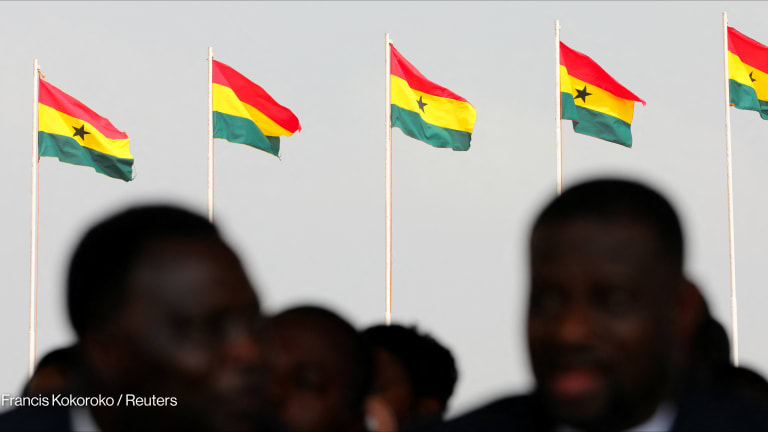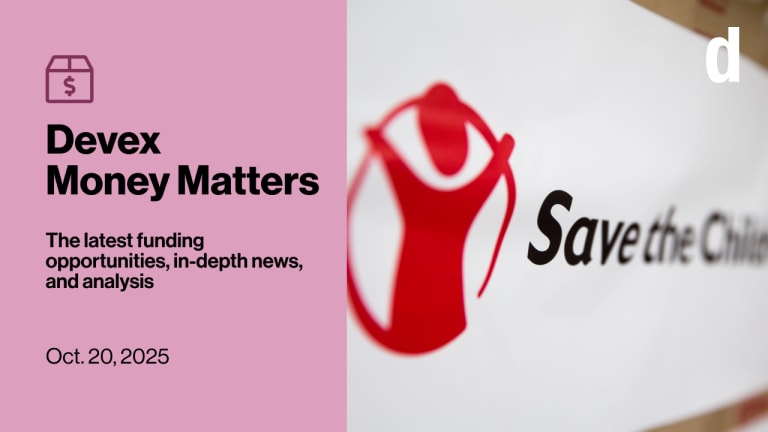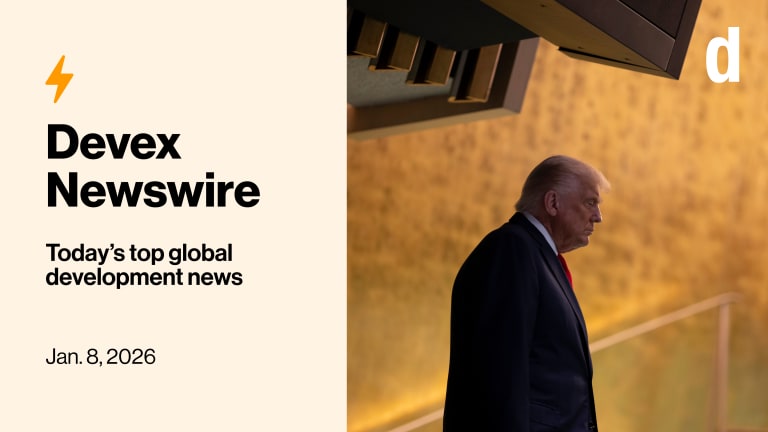Presented by International Monetary Fund

U.S. President Donald Trump oscillates between dismissing the United Nations and dictating how it works.
Also in today’s edition: The U.S. government shuts down while Africa embarks on a reset.
+ We’re still buzzing from the energy of Devex Impact House @ UNGA, where our community came together to spark new ideas and bold conversations. In just a couple of weeks, we’ll bring that same energy to Washington, D.C., alongside the World Bank and the International Monetary Fund annual meetings. Join us on Oct. 15-16 for Devex Impact House @ WB/IMF. Request for an invite now.
Poison pill?
The Trump administration has asked the United Nations to remove the Egyptian executive director of the U.N. Office on Drugs and Crime, Ghada Waly, from her post and install an American, Chhaya Kapilashrami, in her place.
That’s not the head-scratching part. Waly is due to leave her post in a few weeks, and Kapilashrami would’ve become the acting director at that point.
While the “strong” recommendation seems strange given the tight timing, it could signal a more proactive U.S. role at the U.N. drug agency at a time when the administration is militarizing its own policy toward the international drug trade, my colleague Colum Lynch writes in his exclusive report.
“To every terrorist thug smuggling poisonous drugs into the United States of America: Please be warned that we will blow you out of existence,” Trump warned in his address to the U.N. General Assembly — which took place not long after the White House authorized blowing up Venezuelan vessels accused of transporting drugs.
Trump’s push has set off a geopolitical battle inside the U.N. over drugs and crime. Colum writes that the U.S. is keen to head off efforts by China, which is currently promoting an unknown contender, and Mexico, which privately floated potential prospects, to lead the U.N. drug agency, according to one senior official.
The official, who spoke on condition of anonymity, speculated that Mexico would be too strong on human rights for the Trump administration’s liking. Meanwhile, Italy and Britain are also floating the names of candidates for the job, the official said. “They are more keen to block China and avoid [a] narcoliberal in the bargain.”
Another apparent irritant for the administration? Waly resigned in May to be with her family after her mother died, moving from Vienna to Cairo to carry out the rest of her duties from there.
In a Sept. 10 letter to U.N. Secretary-General António Guterres, the then-U.S. chargé d'affaires to the U.N., Dorothy Shea, wrote that the U.S. initially agreed to “accommodate her in an interim period” but now opposed the remote work setup.
“We expect hands-on, active leadership at all major UN offices,” Shea wrote.
Exclusive: US seeks ouster of UN drug and crime agency chief
The US shuts down
Welcome to Day 1 of the U.S. government shutdown, which has thrown yet another wrench into the already-turbulent world of foreign aid spending. At 12:01 a.m. today, the government officially closed for business — well, most business. State Department guidance issued ahead of this slow-motion budget meltdown spells out which kinds of activity are permitted to continue under a shutdown, and which kinds are not. It’s a long and winding read, but my colleague Michael Igoe parsed the bottom lines:
• A huge number of State Department employees face furlough. According to the document, 10,344 direct hire personnel will keep working, of the 26,995 currently employed.
• Grants and contracts that already have funding will continue, but only if there are enough “excepted” employees still working to provide oversight.
• There won’t be any new spending obligations, except in rare cases where it is needed for an emergency response that saves lives or property, or is critical to U.S. national security.
• The State Department won’t be making job offers, giving speeches, or posting on social media.
Don’t worry, though, we suspect Trump will be posting plenty on his Truth Social platform.
ICYMI: The $6.5B US foreign aid spending spree (Pro)
Accra-l opportunity
African leaders are calling for a historic reset of the development-as-usual architecture, which is buckling under the weight of aid cuts. The plan was born in Accra, Ghana, where African leaders, policymakers, and experts met in August to tackle plummeting health assistance and craft a new path toward health sovereignty — one rooted in national ownership and more equitable global cooperation, my colleague Sara Jerving writes.
They reconvened at last week’s U.N. General Assembly to expand the “Accra Reset” beyond health to development more broadly in areas such as climate resilience, food security, and economic growth.
“From Accra, a message went out to the world: If we are to heal our health systems, we must first reset development itself,” said Ghanaian President John Dramani Mahama during UNGA.
Health will serve as the proof of concept, given the long dependence on foreign aid, with lessons applied to other sectors.
But before seeking global partnerships and external finance, the vision calls on countries to use existing funding more effectively.
“We don’t have to fight for resources. We can just be more creative with the resources and partnerships that we have,” Ngozi Erondu, technical director at the Global Institute for Disease Elimination, said at Devex Impact House, where various experts reflected on the Accra Reset.
Dr. Victor Bampoe, chief executive of Ghana’s National Health Insurance Authority, told us that countries need to commit to this reset for the long haul, not simply during UNGA. “It’s not just another flavor of the day, or flavor of the month,” Bampoe said.
Furthermore, Mark Dybul, former executive director of the Global Fund to Fight AIDS, Tuberculosis and Malaria, said donors share the blame for the dependency trap.
Part of the “sociology” of organizations and bureaucracies, he said, is to have their own systems, reporting requirements, and governance structures — rather than working within country-wide, integrated systems — leaving countries with balkanized systems.
Ghana’s president, however, stressed that these efforts aren’t a rejection of the legacy aid system’s achievements, but the launch of a crucial next phase.
“It is indeed right that the global south should take the lead,” Mahama said, “for it is in our countries that the collapse of the old world model will be felt most acutely, and it is from our innovations that the world can find new answers and solutions.”
Read: The ‘Accra Reset’ — time’s up for the legacy aid system
Home grown
Kennedy Odede, founder of Shining Hope for Communities, or SHOFCO, has already seen the impact of health cuts in the informal Kenyan settlements where his nonprofit works.
“You can see what’s happening now around the world, where the global north are cutting their funding for the communities. And right now, we are seeing many big organizations running away. Who is left?” he asked at Devex Impact House. The answer? Local community-based organizations.
While many development organizations talk about localization, Odede lives it. Once a street child who survived by scavenging from garbage bins and stealing food, Odede went on to create SHOFCO, a world-renowned Kenya-based organization delivering health and education services, among other things, to informal settlements.
While SHOFCO didn’t directly depend on USAID funding, Odede said it’s seen a significant increase in patients attending its clinics, for example, because they were no longer able to access services that USAID once funded.
While he sees short-term pain in the cuts, he also sees long-term opportunity.
“There’s something positive I’ve seen happening,” he said. “I see governments trying to adjust — to spend more on health.”
Ultimately, Odede said, localization needs to be driven by local people taking power for themselves, not being handed it from abroad.
“If we bring in private partnership and start kind of forgetting the idea of money from abroad, I think that’s the future,” he said, “whereby companies in each country are trying to be partners with local organizations. That’s how we’re going to have this thing called localization. Otherwise, it will just be a theory.”
Read: How African communities are responding to the aid cuts (Pro)
+ A Devex Pro membership lets you get the most out of our coverage of globaldev’s localization drive. Not a Pro member yet? Start your 15-day free trial today, and check out all the exclusive content available to you.
In other news
A magnitude 6.9 earthquake struck central Philippines, killing dozens and triggering frantic rescue efforts, while a magnitude 6 earthquake in Indonesia caused a school to collapse in East Java, leaving at least three dead. [The New York Times and South China Morning Post]
The U.N. Security Council has approved transforming Haiti’s current security mission into a larger military-style force of up to 5,500 troops and police to confront gang violence in the Caribbean nation. [The Guardian]
Sign up to Newswire for an inside look at the biggest stories in global development.








